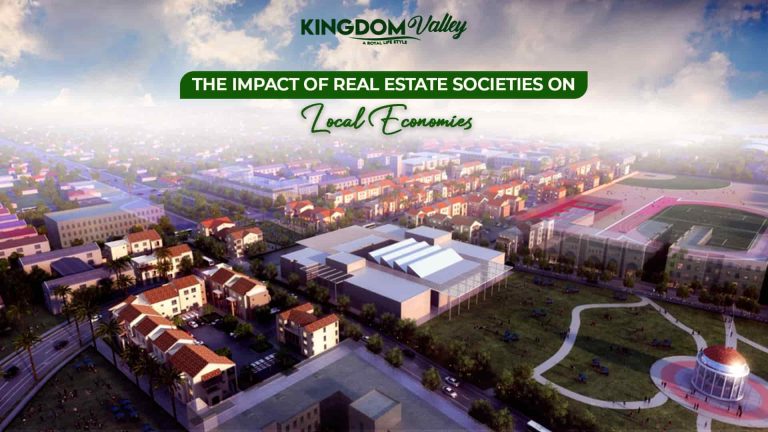The Impact of Real Estate Societies on Local Economies

Discussing Influence on Local Economy, Jobs, and Industry Growth
Introduction
Impact of Real Estate socities have long been a cornerstone of urban development and growth. These organized residential and commercial communities contribute significantly to local economies by generating jobs, fostering industry growth, and enhancing infrastructure. One such example is the “Kingdom Valley Islamabad” housing society, which exemplifies the crucial role that real estate societies play in shaping local economies.
The Role of Real Estate Societies in Local Economies
Real estate societies are planned communities that offer a range of residential, commercial, and recreational facilities. These societies have a profound impact on local economies due to their extensive scale and comprehensive nature. They drive economic growth in multiple ways:
1. Job Creation
One of the most evident impacts of real estate societies on local economies is job creation. The development, construction, and maintenance of these societies require a diverse workforce, including architects, engineers, construction workers, real estate agents, property managers, security personnel, and administrative staff. The employment opportunities provided by real estate societies extend to various skill levels, making them a vital source of livelihood for the local population.
2. Industry Growth
Real estate societies act as catalysts for the growth of related industries. The demand for construction materials, furnishings, appliances, landscaping services, and other goods and services leads to the expansion of local businesses. Small and large businesses alike benefit from the continuous influx of residents and consumers in these societies, which stimulates economic activity and revenue generation.
3. Infrastructure Enhancement
When real estate societies are developed, there is often a corresponding improvement in local infrastructure. Developers and local authorities collaborate to upgrade roads, utilities, transportation networks, and public spaces to meet the needs of the growing community. This infrastructure enhancement benefits not only the society’s residents but also the broader local population, contributing to overall urban development.
Also Read: The Magnificence of Kingdom Valley Islamabad: The Capital’s Glittering Pride
Kingdom Valley Islamabad: A Case Study
The “Kingdom Valley Islamabad” housing society serves as an example of how real estate societies can influence local economies positively. This society, situated on the outskirts of the capital city of Pakistan, showcases the transformative effects of organized urban planning and development.
1. Economic Growth
The establishment of Kingdom Valley has brought about a surge in economic growth in the region. The society’s construction has spurred demand for construction materials, skilled labor, and services, thereby providing numerous employment opportunities. Local businesses, from hardware stores to service providers, have experienced increased sales and expansion due to society’s development. This injection of economic activity has led to a more prosperous local economy.
2. Employment Opportunities
Kingdom Valley Islamabad Location has played a pivotal role in job creation. The development process alone required a diverse workforce, including architects, engineers, laborers, and project managers. As society continues to grow, job opportunities in property management, security, hospitality, retail, and education have emerged. This diverse range of employment options has attracted individuals from neighboring areas, reducing unemployment rates and improving overall living standards.
3. Infrastructure Development
In line with the establishment of Kingdom Valley, local infrastructure has undergone significant improvements. Roads leading to the society have been upgraded to accommodate increased traffic, and utilities have been modernized to cater to the growing population’s needs. Additionally, amenities such as schools, healthcare facilities, and recreational spaces have been established, benefitting both the society’s residents and the surrounding communities.
4. Attraction of Investment
Real estate societies often attract both domestic and foreign investment. The well-planned, secure, and amenity-rich environment of Kingdom Valley has drawn the attention of investors looking to capitalize on the society’s growth. This influx of investment not only supports the society’s expansion but also contributes to the overall economic development of the region.
5. Community Engagement
Real estate societies also foster community engagement and social interaction. Kingdom Valley’s emphasis on communal spaces, recreational facilities, and events encourages residents to participate actively in various activities. This sense of community contributes to a vibrant social life and can also lead to the creation of local businesses that cater to residents’ needs and preferences.
Conclusion
Real estate societies wield a substantial influence on local economies, jobs, and industry growth. Through job creation, industry expansion, infrastructure development, and community engagement, these societies contribute to the overall prosperity of the regions they are located in. The case study of Kingdom Valley Islamabad exemplifies how a well-planned housing society can bring about transformative changes in a local economy. As urban development continues to evolve, the role of real estate societies in shaping and enhancing local economies remains pivotal.
